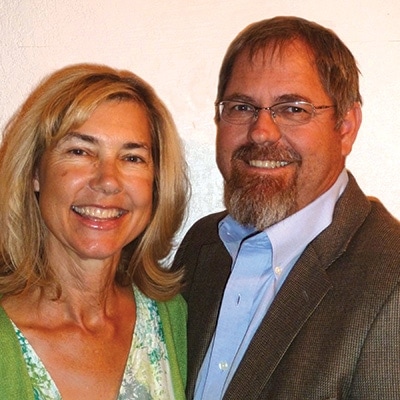

When Mary Jo and Daryl Oft walked through the doors of the Payson, Arizona, Adventist Church one Sabbath in 2005, they had no idea that by the time they left, their lives would be forever changed.
At the time the Ofts were not regular churchgoers. Their family-owned occupational health business kept them busy, and they admit to finding it easy to stay home on Sabbaths. But one particular week they attended church when Duane McKey, then Arizona Conference president, was the speaker. Following the service they remained for potluck and somehow found themselves sitting next to McKey and his wife, Kathy. A discussion about mission ensued, and by the end of the conversation the Ofts had agreed to travel to Kenya to preach for a series of evangelistic meetings. They were to leave in three weeks.
“We couldn’t believe what was happening,” Daryl says. “We had a business to run!”
The Ofts were true to their word, however, and soon they were sharing the love of Jesus in the village of Kaswanga on the island of Rusinga in western Kenya. By the time they left the island, they knew that for them it would no longer be business as usual.
“We didn’t want to lose the experience we had in Kenya,” Mary Jo says. “We had learned to depend completely on God, so we prayed that He would not let us go back home and be the same. And God definitely got things going quickly. We became involved right away with a local evangelistic series.”
The couple’s thoughts, though, kept drifting back to Kenya. While in Kaswanga, the Ofts had noticed an old windmill that used to pump water but no longer worked. Daryl was mechanically inclined; he knew he could get it running again so the villagers would have clean water. The Ofts began telling friends and church members about the villagers’ needs, and donations started coming in. So they decided to return.
“It took several trips over two and a half years to complete the water system,” Daryl says. “That included putting in two miles of underground water pipe from the lake to the village, installing a water-intake system that extended 500 feet into the lake, and rebuilding the windmill.”
“We thought we would just do this one thing for the village and that would be it,” Mary Jo notes. “But that was only the beginning.”
While in Kenya, Mary Jo and Daryl noticed the children.
“There were many, many orphans living in their own little huts in child-headed homes,” Mary Jo explains. “They had no adults in their lives. They were completely dependent on themselves to scramble for something to eat. We had to do something to help.”
The Ofts first teamed up with a local man to feed some of the children. Then in 2008 they opened the doors of Living Waters Feeding Center, where more than 150 children now come every day for food, clothing, and medical care. The center is funded totally by donations.
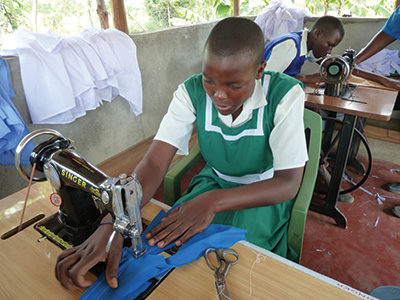 “We are a faith-based organization,” Daryl says. “Living Waters International operates on faith and the generosity and support of donors, just ordinary people who help support us.
“We are a faith-based organization,” Daryl says. “Living Waters International operates on faith and the generosity and support of donors, just ordinary people who help support us.
“In 2012 we received our 501(c)(3) status with the IRS, and we’re governed by seven board members,” he adds.
Seeing the number of children with life-threatening diseases and infections, the couple eventually opened a medical clinic. Physicians, dentists, and other health professionals volunteer their time there for short-term stints. Living Waters has also built a school that is currently offering preschool through fifth grade to 125 students.
Following advice McKey gave them early in the venture, the couple has worked closely with the local Kenya Lake Conference and other church leaders. In fact, Living Waters owns no assets at all in Kenya. They have all been turned over to the Kenya Lake Conference.
“The work Mary Jo and Daryl Oft are doing at Living Waters in Kaswanga has really been a blessing to the community, the members of the church, and the conference,” says Tobias Panyako, president of Kenya Lake Conference.
Mary Jo and Daryl’s ministry has since stretched beyond the boundaries of Kaswanga. They partnered with Maranatha International and local Kenyans to erect 111 One-Day Churches
1 throughout Kenya, which are being used not only as places of worship but also as schools and medical clinics. One church was built inside a Kenyan maximum-security prison, where 300 inmates have so far been baptized. Then following Typhoon Haiyan in the Philippines, the Ofts, together with their three sons, Justin, Joby, and Rusty, and their son-in-law, Ricky Wheeler, helped to install nine water purification systems in that country, as well as one in Honduras and one in the Republic of Kiribati.
In spite of all the results of their ministry, however, the Ofts claim no credit.
“Absolutely nothing that has happened has anything to do with Mary Jo and me,” Daryl says. “It’s all about God and how He has used the most unlikely couple, ordinary people, to do what He wanted to do.”
To learn more about Living Waters International, go to www.livingwatersintl.org or e-mail [email protected].
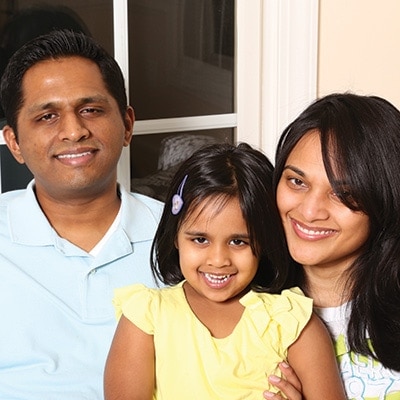
Shalini’s desire to help children developed early while traveling with her parents on visits to India, their native country. Shalini saw conditions there that left a lasting impression.
“There were so many children living in slums and on the streets,” Shalini explains. “I decided that when I grew up I would help children.”
After graduating college with a nursing degree, Shalini went to Kasese, Uganda, in 2004 on a mission trip with ShareHim.
2 There she saw children in the streets wearing little clothing and no shoes, “much like the kids I had seen in India,” she says. So with the help of two local Ugandan girls, she went into some of the poorest areas.
“I talked with the children, took them food, and listened to their stories and their parents’ stories,” Shalini explains. “There were single moms whose husbands had left them or died. In some cases both parents had died. Many of the kids just end up wandering the streets, unable to go to school.”
Shalini left $100 with a local pastor there and asked him and the two girls who had helped her if they would be willing to use the money to pay the first month’s rent on a facility to use as a home for children and to help look after them. She promised she would send more money as soon as she could. The pastor and the girls agreed.
Shalini talked to her mom, Elizabeth, about the situation. “I want to start a home for children in Uganda, where they can learn about Jesus and go to church and to school,” she told her. Her mom, also a nurse, talked to friends and coworkers about her daughter’s plan, and raised $2,000. After hearing the story about the Ugandan children, one of the nurses, Evon David, quit her job and with the $2,000 that had been raised she went to Uganda and opened a home for orphans.
“It was amazing!” Shalini says. “We started with about 15 children; we now have 27 kids living in the home, cared for by Evon and five local staff.”
These women and a team of volunteers make up the nonprofit organization called Christalis. Their main project is a home for children who are abandoned or orphaned, where they provide not only for their basic needs but love and a family atmosphere as well.
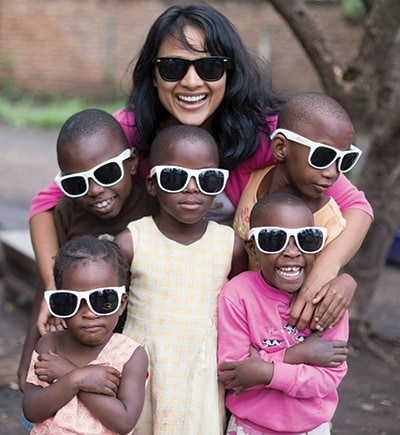
Christalis also offers an assistance program for children from low-income families. The organization provides their tuition, school supplies, uniforms, health care, and other needs. In addition, it runs a feeding program, providing lunch and dinner for children who don’t have enough food at home.
How does the organization find the money to do all this?
“Somehow God brings us the money that we need through sponsors, donors, and the hard work of our volunteers. It’s literally a month-by-month miracle; a journey of faith every day,” Shalini says.
Christalis is currently partnering with Associated Students of Walla Walla University in Washington State,
3 working to raise funds to construct a larger home. The university will help to build the new home. It also has sent three student missionaries to Uganda to help with the projects.
All the efforts and faith are paying off. Manasseh, whose grandmother brought him to the home when he was 13, recently graduated from Bugema Adventist University with a Bachelor of Science in Secondary Education. Manasseh’s parents died when he was a toddler, and his grandmother was unable to continue to look after him. Evon and the staff loved and cared for him and supported his education.
Adam and Annette have been at the home since rebel soldiers shot and killed their parents. “You wouldn’t know they’ve been through so much; they’re just so happy,” Shalini says.
The needs are so great that they can sometimes seem overwhelming, Shalini says, “but even if you help only one child, you’re changing their world.”
To learn more about Christalis, go to www.christalis.org, or e-mail [email protected].
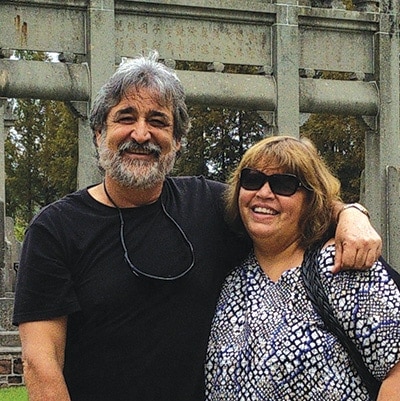 Phillip Rego
Phillip RegoA retired landscape designer living in Bermuda, Phillip Rego felt called to ministry, but he wasn’t sure in what way. A friend suggested he attend the Adventist-laymen’s Services and Industries (ASI) meetings being held that year in Florida, so he did. He was inspired by the many ministries there, but was particularly drawn to the needs in Haiti.
“I was given the name of one Adventist person in Haiti, so I contacted him and then just got on a plane and flew to Port-au-Prince,” Phillip says. “This was following the hurricanes that went through Haiti in 2008, and the people were in desperate need. Some people were going days without eating. Many had no furniture, no beds, no clothes. I saw desperation in their eyes. It really upset me.”
Phillip worked with his Haitian contact and an Adventist relief organization that was then in place in Haiti to bag and distribute rice and beans to the hungry people. Thousands of people filled the feeding centers while waiting for assistance.
“They were coming in one gate and going out the other,” Phillip says. “Before we knew it, the food was gone.”
After Phillip returned home, he talked to friends and other church members, sharing the needs of the Haitian people. Donations flowed in, so with those funds in hand he returned to Haiti. Phillip, however, wanted to do more than feed people. He specifically wanted to help the children.
“When I saw how needy the children were, the kids who just live on the street, it tugged at my heart,” he explains. “They have no adults to care for them. Many have no identity at all, no birth certificates. And they cry from hunger. I had to do something.”
 Phillip first rented a small, poorly constructed facility in the coastal town of Montrouis (located about 43 miles [70 kilometers] north of Port-au-Prince), in which he housed 23 children. But he needed a bigger, better place. Eventually he connected with the chief accountant of a Bermuda restaurant chain, who gave him $30,000 to help the children in Haiti. With that money Phillip was able to purchase a piece of property and begin building a new home for orphans. That home now houses 56 children.
Phillip first rented a small, poorly constructed facility in the coastal town of Montrouis (located about 43 miles [70 kilometers] north of Port-au-Prince), in which he housed 23 children. But he needed a bigger, better place. Eventually he connected with the chief accountant of a Bermuda restaurant chain, who gave him $30,000 to help the children in Haiti. With that money Phillip was able to purchase a piece of property and begin building a new home for orphans. That home now houses 56 children.
As the ministry Phillip named Feed My Lambs grew, he hired a lawyer and organized a board of directors in Haiti. The board oversees the running of the organization and the use of the donated funds.
“Everything is under the board’s name,” Phillip notes.
Phillip’s wife, Maria, travels frequently with Phillip to Haiti. “The kids love her like a mother,” Phillip says.
Feed My Lambs didn’t stop with an orphanage. With funds and supplies coming in and transported to Haiti in what Phillip describes as miraculous ways, the organization opened a school in October 2013, which has a current enrollment of 700 students. A medical clinic soon followed, run by a health-care team that includes a full-time doctor, a lab assistant, a nurse, and a pharmacist. The medical team serves about 350 people a month.
Phillip credits his ministry for the people of Haiti with turning his life around spiritually.
“I played the part and sat in church,” he says, “but I was actually far from God. Helping people rescued me.”
He adds, “I look into the eyes of the people I’m helping—people who have absolutely nothing—and it just gives me a feeling inside that my team and I are doing something worthwhile. When you learn to give,” he says, “you learn to live.”
To learn more about Feed My Lambs, go to FeedMyLambsMinistry.org or Feed My Lambs Children’s Ministry on FaceBook. Also e-mail [email protected].